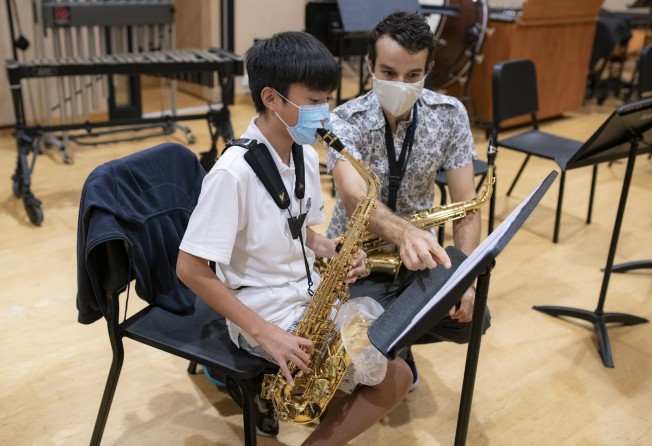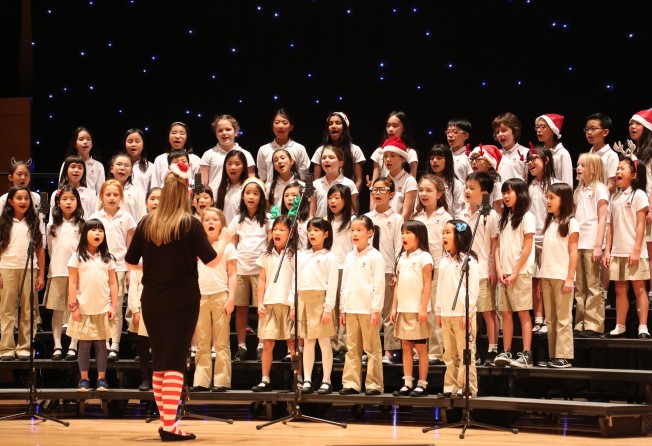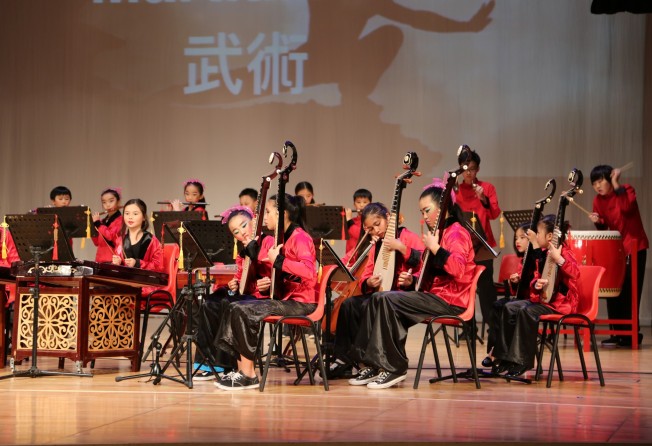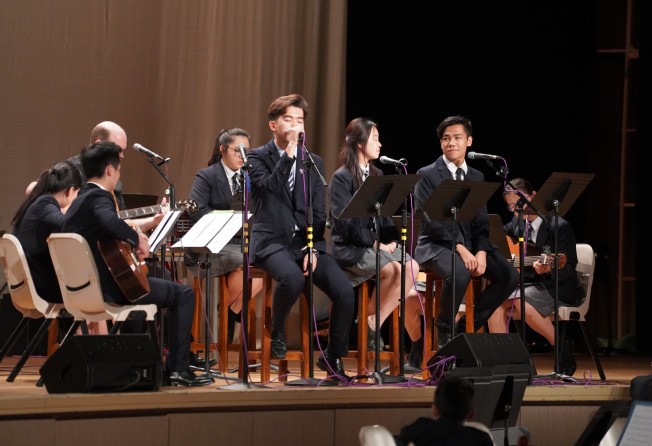
Music classes in Hong Kong international’s schools provide pupils with social, cultural and emotional benefits
- When children take control of their musical expression, it gives them a creative outlet and freedom of expression that is difficult to achieve through traditional means
- Schools like HKIS, CDNIS and Harrow Hong Kong have significant musical programmes in their curriculum, and even participate in festivals and competitions

Read more of SCMP’s Good Schools Guide
The cognitive benefits experienced by children learning musical instruments are well documented. But great schools take things a step further by offering music programmes that provide social, cultural and emotional benefits as well.
Christopher Ward, band director of the middle and high school sectors at Hong Kong International School (HKIS), wanted to be a music teacher ever since attending a high school music camp that had a profound effect on his life. Today, he hopes to inspire that same teenage enthusiasm in his students.
After four years of serving as a band director at an international school in Abu Dhabi, and getting a master’s degree in conducting at the prestigious Northwestern University in the US, Ward landed his dream job at HKIS in 2019 – joining a top school that boasts six bands, eight choirs and six string groups, and with around 800 students in the music programme between grades six through 12.

“We offer general music until grade five, and that’s also supplemented with some extracurricular programmes like beginning band, beginning strings and choir for students in upper primary. Then in middle and high school, all the music programmes are ensemble-based instruction and take place during the school day,” Ward said.
“It’s a very big programme and pretty well known across the world and the international school scene,” Ward continued. “If you were to say ‘HKIS music’ to someone who teaches music at an international school in say, South America, they probably would have heard about our programme.”
HKIS and Ward’s philosophy is to let children take control of their musical expression, to give them a creative outlet and freedom of expression that is difficult to achieve through traditional means.
“We don’t compose any of the music,” he explained. “Yes, we do conduct, but we aren’t just standing on the podium dictating things. We try to get the students involved in the process of learning the music. HKIS emphasises inquiry, helping the students and guiding them to learn more about music and develop their skills organically, rather than just dictating like maybe an old-school conductor might do.”
Another of Ward’s policies is to promote collaboration. While HKIS encourages (but does not require) students to fine-tune their instrument skills after school hours, they spend much of their time warming up, composing, practising and experimenting together during band, string and choir sessions.
“I think students love making music with other people. Music is already fun to play in and of itself. But to be in a section as a clarinet or trombone player, with six other people on the same instrument, and then to be part of an ensemble that’s composed of 60 people, all with the same effort to put together a beautiful piece of art, that is a pretty unique thing,” Ward said.
He believes students grow through the opportunity to collaborate and learn music together. “There are certain times in the year when we allow the students to lead themselves, to learn how to collaborate effectively, knowing that sometimes it’s going to be messy, or they might not accomplish as much as they could with a teacher there. But the learning experience is probably going to be a lot deeper and more valuable than if we were heavily involved in the process,” Ward said.
This approach has been tremendously successful – despite the lockdowns and restrictions that made it extremely difficult to practise, HKIS won a bevy of awards at a virtual solo and ensemble festival hosted by the Association for Music in International Schools.
HKIS clocked the highest participation of all international schools in Asia, with 70 students taking part, and 68 of those students receiving the highest honour.
“In the high school competition sector, nine students made it to the final round, and one of our students on the oboe won the entire competition for their instrument,” Ward added.
With Covid-19 restrictions easing, Ward hopes to arrange collaborative performances with other Hong Kong international schools which have strong music ensemble programmes, including the Canadian International School of Hong Kong (CDNIS).
CDNIS’ new director of visual and performing arts, Anne Drouet, has a wealth of experience at international schools all over the world, including the UK’s renowned Brit School for Performing and Creative Arts in the UK, famous internationally for its pop star alumni that includes Amy Winehouse, Adele and Leona Lewis.
“In a world that is ever changing, CDNIS managed to keep up its tradition with wind band and orchestra to an impressive performance standard,” said Drouet, who is also executive director of the International Schools Theatre Association (ISTA) Arts Academy.

CDNIS offers music and drama from preparatory all the way to grade 12, and younger students at CDNIS engage with music through dancing, singing, creating and performing in a variety of contexts.
“Combined with the power of drama, our students grow in confidence and communication skills, and learn to work together compassionately. The joy and energy that radiate from our performing arts classrooms is inspiring to all,” Drouet added.
The upper school music programme aims to develop students’ resilience, patience, collaboration and creativity through “rigorous expectations and standards”. The programme is also expanding to include contemporary music in addition to traditional.
While at many schools it sometimes feels like learning an instrument is treated as an elaborate way of boosting university applications, Drouet hopes to give students the option, as well as the necessary resources and support, to pursue a career in music and the performing arts.
Her plans include connecting musicians and budding songwriters to music industry experts, and she points out that the school has a number of alumni who are blazing trails in the world of music. “Our alumni artists currently have more than 21 million streams on Spotify, and we are so proud,” she said.
Notable alumni include Chance Emerson, who has over a million streams on his song, “Paperdreams”; Elio Kaczmarek (his stage name) who graduated last year and has a song with 500,000 streams; and Sam Kaiser who graduated in 2018 and had a song listed on Spotify’s Best Folk Songs of 2021 Canada playlist.
Our alumni artists currently have more than 21 million streams on Spotify – and we are so proud
Our alumni artists currently have more than 21 million streams on Spotify – and we are so proud Anne Drouet, Canadian International School of Hong Kong
However, Drouet isn’t just focused on helping CDNIS students, she also wants to reach out to passionate young musicians across the city. To that end, she will be bringing the ISTA Arts Academy to collaborate with the school, in “an independent playground” young people living in Southeast Asia can come together to collaborate and create original work.
“We offer the chance for young people to excel, and to connect with each other and industry experts,” Drouet said.
Her team is currently celebrating its musical production of Shrek, performed last month in the school’s 604-seat theatre – the first live theatre production open to the public the school has hosted since the start of the pandemic.
Additionally, CDNIS will host the Interschool Battle of the Bands on December 10. The event is open to all bands and solo artists aged 10 to 18, with the top prize a recording session in a local studio and the chance to be critiqued by a Grammy nominee who has worked with the likes of Christina Aguilera, Snoop Dogg and Paul McCartney.
“I hope this and other events will help our budding musicians to join forces,” Drouet said. “Who knows what creative collaborations will emerge as a result? After that, we’ll be calling upon event space owners to support us for private and public gigs.”
Much like HKIS’ Ward, one of Drouet’s most formative experiences growing up was playing in a community orchestra with musicians from all over Warwickshire, UK.
“I promised myself to pursue music even though my dad wanted me to be a doctor,” she said. “I hope to inspire students in Hong Kong in the same way.”
Watch this space: it might not be long before we see a joint CDNIS-HKIS concert.

Finally, Tom Wiggall is director of music at Harrow International School, a prestigious British institution which prides itself on a rich musical history. Wiggall points out the significant impact music has on all aspects of learning, as well as cultivating leadership, teamwork, creativity and resilience.
“While music is a rich subject in its own right, musicians also find themselves more able to succeed in other academic disciplines. The standard of programmes is very high and most pupils learn at least one instrument,” he said. “This makes the overall music scene in the school particularly vibrant. There are over 250 individual lessons taking place each week with 30 ensembles rehearsing regularly, and a programme of concerts, competition and workshops.”
Harrow UK’s 450th anniversary coincides with Harrow Hong Kong’s 10th anniversary this year and the latter school is hosting the Harrow International Music Festival, featuring concerts both here and over the border in Harrow Shenzhen. Each concert will include a mixture of live and recorded elements, featuring a cappella singing, instrumental music, choral items, a soloist and Chinese drumming.